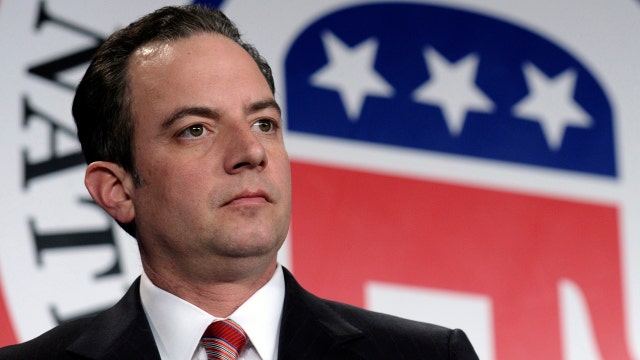Reince Priebus: 'CNBC should be ashamed'
Strategy Room: RNC chairman vows to ensure future GOP debates 'allow for a more robust exchange'
In two days, presidential politics have gone from Sen. Ted Cruz nuking CNBC to the GOP nuking CNBC’s parent network as well for its “bad faith” handling of the debate. Like any nuke, the fallout might even be worse.
Republican National Committee Chairman Reince Priebus sent a letter to NBC canceling a planned debate in February. According to Priebus, the GOP is “suspending the partnership with NBC News for the Republican primary debate at the University of Houston on February 26, 2016.”
Priebus listed a series of grievances against the media giant, including, how CNBC “billed the debate as one that would focus on ‘the key issues that matter to all voters—job growth, taxes, technology, retirement and the health of our national economy.’ That was not the case.”
That’s an understatement. The resulting debate was so awful even liberal media critics didn’t defend it. But now journalists will do so, fearful that fallout might contaminate their reporting, too. The last thing newsies want is for the American public to be reminded by a national political party that most of news stories in America have an overwhelming left-wing slant.
Yet, it’s almost as if that’s precisely what NBC wanted. An analysis of the debate questions, “found nearly two-thirds (65%) hit the candidates with negative spin, personal insults or ad hominem attacks.
The day after the debate dust-up, CNBC’s Carl Quintanilla reminded viewers how liberal he really is. Responding to reports China was relaxing its mandatory one-child policy, he Tweeted: “One thing about China's one-child policy: it worked.”
Yes, forced murder of babies was very effective. Forced murder of 360 million to 400 million babies – against the wishes of their parents. Very effective. Wonder if Quintanilla would say Turkey’s forced murder of 1.5 million Armenians “worked.”
NBC wasn’t happy to be losing the debate. It issued a brief statement, saying, “This is a disappointing development. However, along with our debate broadcast partners at Telemundo we will work in good faith to resolve this matter with the Republican Party.”
CNBC didn’t like the story either, downplaying the breaking news that the GOP had kicked it out of the upcoming debate. “While MSNBC and CNN offered extensive commentary and analysis, CNBC allowed just a minute and eight seconds since the story broke around noon,” wrote Newsbusters Scott Whitlock. (Full disclosure, he sits about 50 feet from me.)
Translation of all that: NBC doesn’t want to lose the February debate, and all the notoriety and ad dollars that come with it. More importantly, NBC doesn’t want to be left out of any general election debate, which a suspension might well include. That could cost real money, real status and maybe even convince advertisers that Brian Williams wasn’t exactly unique.
The Fallout
Journalists are already building their media bomb shelters to guard against the debate fallout. Liberals and journalists are both terrified that the debate will continue to undermine the media’s already waning credibility. Journalists rank near lawyers on honesty and ethics, according to Gallup. That’s above politicians and not much else.
CNN/New York Times media critic Brian Stelter said on Twitter: “Important to note: the NBC exec in charge of the suspended 2/26 debate, Andy Lack, doesn't oversee CNBC... it operates independently...” That’s not exactly true. Quintanilla has been on or cited by NBC 129 times just in the past year. He has also served as a fill-in anchor, as recently as June 14, 2015.
Over at lefty Salon, they accused the GOP of “trying to hold journalism hostage.” Vox’s Ezra Klein (who is really just a Democratic PR guy), “argues that the moderators were just doing their jobs: ‘The problem for Republicans is that substantive questions about their policy proposals end up sounding like hostile attacks — but that's because the policy proposals are ridiculous, not because the questions are actually unfair.’”
New York University journalism professor and media critic Jay Rosen summed up one point that will be much discussed in coming days: “I still don't understand — and the news stories aren't framed this way— what did the Republicans expect from CNBC?”
One candidate explained that well during the debate, though it was clear no one in GOP leadership grasped it beforehand. “You know, the Democrats have the ultimate Super PAC. It’s called the mainstream media,” said Rubio debate night. Maybe some in the GOP are willing to admit it.
Dan Gainor is the Boone Pickens Fellow and the Media Research Center’s Vice President for Business and Culture . He writes frequently about media for Fox News Opinion. He can also be contacted on Facebook and Twitter as dangainor.





















